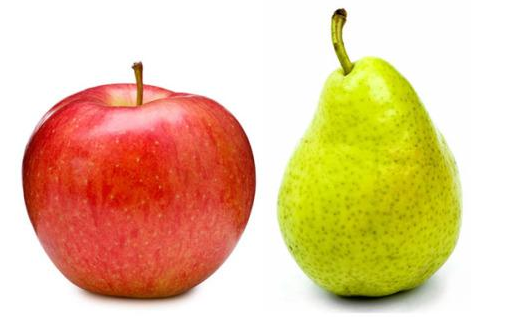(单词翻译:单击)
Where you gain weight isn't a game of chance. Turns out it's all in your genes. (Photo: iStock)
你容易肥胖并不是偶然,而是基因造成的。
If you've ever read a women's magazine, you're familiar with the concept of "apple" versus "pear" body s hapes. They're the two most common presentations of the human body — in the first case, fat gatl around the midsection, in the latter, fat accumulates around the hips, thighs, and rear.
如果你曾经读过一本女性杂志,你就会非常熟悉苹果型或梨型身材的概念。它们是有关身材的两种最常见描述。前者,脂肪集中在上腹部,后者,脂肪集中在臀部,大腿部和屁股上。

Now, researchers from Duke University have pinpointed a gene, called Plexin Dl, which determines the bod y type you'll have with a great deal more certainty than any magazine quiz ever could.
现在,杜克大学的研究人员们发现了一种基因,称为丛状蛋白D1 ,它能决定体型,这比杂志更可靠。
Now, for those who think that your body shape is only a barometer of the style of jeans you choose, or if you should opt for the A-line vs. the empire waist wedding dress, take heed: Your body shape has everything to do with your health.
那么,你以为你的身材只是在挑选牛仔裤时用来比对号码的吗?还是用来选择vs裙或高腰婚纱的呢?请注意:你的身材代表了你的健康程度。
An apple shaped body, which has greater fat accumulation in the belly, carries with it the risk of heart disease. Fat concentration in the midsection is also thought to induce inflammation and trigger metabolic diseases including high blood pressure, stroke and diabetes.
苹果型身材,腹部聚集了大量脂肪,会增加心脏病的风险。上腹部脂肪过多也容易诱发炎症并导致代谢病,比如高血压,中风和糖尿病。
A pear body shape, on the other hand, is considered to be pretty healthy. This shape accumulates fat in the hips and thighs, which is associated with increased fertility and a decreased risk of metabolic diseases like diabetes.
相反,梨型身材意味着身体健康。这种身材的脂肪集中在大腿和臀部,有助于生育,也减少代谢病——比如糖尿病的几率
Now let's get back to that study.
现在,让我们重新回到主题。
All humans have the Plexin D1 gene. But to simplify their research, the Duke researchers chose to study the gene's effects in zebrafish. Since the fish are transparent, you can actually see where the fat cells are accumulating to easily determine their body shape. John F. Rawls, PhD, and an associate professor of molecular genetics and microbiology at Duke, and James E. Minchin, PhD, a post-doctoral fellow in Rawls' lab, engineered zebrafish without the Plexin D1 gene, and compared them with normal zebrafish who carried the gene.
所有人都拥有丛状蛋白D1基因。但为了简化他们的研究,杜克大学研究人员研究这种基因在斑马鱼身上的影响。因为这种鱼是透明的,他们能清晰的看到脂肪细胞的聚集地,以更容易的确定体型。杜克大学的分子遗传学和微生物学副教授约翰·F·罗尔斯博士,和罗尔斯实验室的博士后伙伴詹姆斯·E·明钦,把斑马鱼的丛状蛋白D1基因剥离,并把它与正常的斑马鱼进行比较。
The fish without the Plexin D1 gene had less visceral fat tissue than their "apple-shaped" counterparts with the gene. Visceral fat is the type of fat that causes an apple-shaped body. It lies deep within the midsection, wedged between organs including the heart, liver, intestine, and lungs. From there, the tissue emits hormones and other chemicals that cause inflammation, triggering high blood pressure, heart attack, stroke, and diabetes.
没有丛状蛋白D1基因的斑马鱼比他们"苹果型身材"的同类拥有更少的内脏脂肪。内脏脂肪是造成苹果型身材的一种脂肪。它存在与上腹部,充斥在脏器们,包括心脏,肝脏,小肠和肺部之间。这些脂肪组织释放出荷尔蒙和其他化学物质,导致炎症,诱发高血压,心肌梗塞,中风,和糖尿病。
Instead, these "pear shaped" fish displayed more subcutaneous fat, which is the type of fat that sits be neath the skin of the hips, thighs, and rear of pear-shaped individuals. This type of fat tissue decrease s insulin resistance in humans 8imdash; which protects us from getting diabetes.
相反,那些“梨型身材”的斑马鱼拥有更多的皮下脂肪,它们存在于臀部和大腿的皮下组织,与梨型身材个体的后身。这种脂肪组织能降低机体的胰岛素耐受性;从而避免我们患上糖尿病。
So should we all try to get rid of our Plexin D1 gene? Not so fast. Michin tells Yahoo Health, that whil e "to have such an extreme effect is surprising," it's important to remember that their research also inv olved an extreme amount of genetic manipulation, wholly eliminating the Plexin D1 gene in the mutant zet a fish in a way that is unlikely to ever occur in real life.
那么,我们都应该抛弃我们的丛状蛋白D1基因吗?不用这么急。Michin告诉雅虎健康板块,当我们知道“极端影响是这 么可怕时”,我们也一定要想起,他们的研究也进行了极端的基因操作,完全丧失丛状蛋白D1基因的变种斑马鱼在现实中是不可能能出现的。
All humans carry the Plexin D1 gene, but we express the gene in different ways. "Body fat distribution is a complex trait that is governed by interactions between multiple genes, says Michin. "We expect that more subtle regulation of Plexin D1 in human populations is likely to occur."
所有人都携带着丛状蛋白D1基因,但是,让我们以另一种方式描述这种基因,"身体脂肪的分配是十分复杂的,是多种基因互相影响的结果,"Michin说,"我们猜想,丛状蛋白D1基因在人体内可能存在其他效应。"
Despite the clear health implications of body fat distribution, little is known about the genetics of body shape. A large international study that appeared in Nature in February began to fill in this gap by looking for genes associated with waist-to-hip ratio. The researchers found some association with Plexin D1 in their study.
即使清晰知晓了身体脂肪分配对健康的意义,我们仍然对体型遗传知之甚少。一个主要研究基因与腰臀比关系的大型国际研究已经在二月份在法蒂尔开始。研究者们已经发现了一些与丛状蛋白D1基因有关的信息。
In the future, this information could lead to understanding how to genetically manipulate our body types — and, more importantly, improve our health in the process.
在未来,这些信息可能会让我们理解基因如何控制我们的体型——同时,更重要的是,改善我们的健康。


